How To Do Proper Keyword Research
- By Steve
- •
- 03 Sep, 2018
- •
How To Do Proper Keyword Research

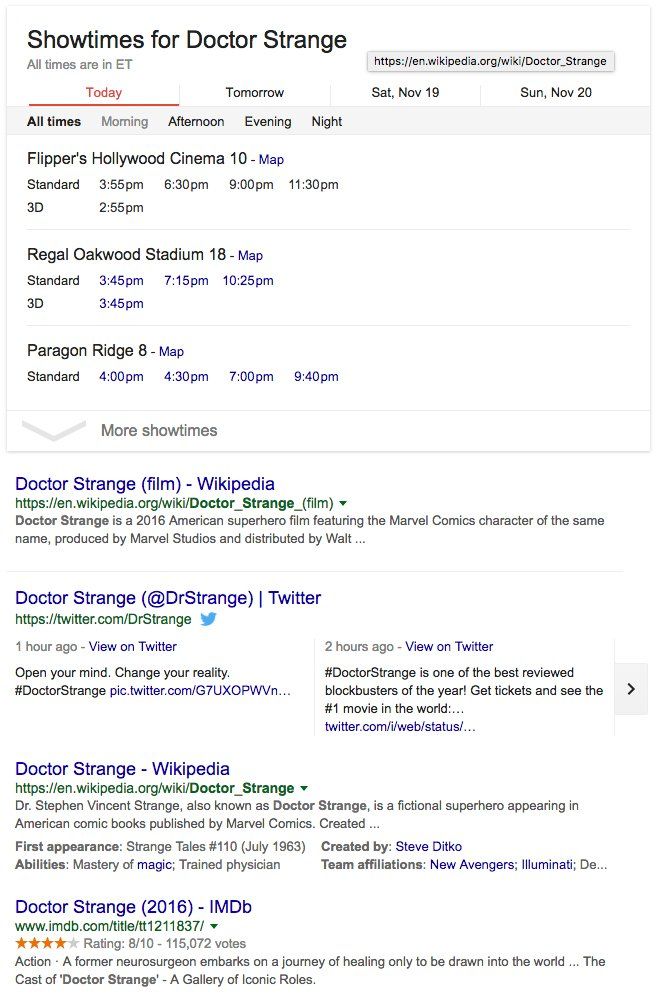
When someone goes into their search engine (Google, Yahoo, Bing, etc.), they are searching for information based on a specific keyword. What they are searching for is basically what every internet marketer in the world is looking for.
The search engines will take that phrase and scour the internet in search of what they desire. Depending on how many pages until that user finds their link or changes their phrase will correct these search engines into creating a more accurate result.
For example, the most common example of which people can see why search engines have a problem are when movies based on books are released. If you were to load up Google and search for ‘Doctor Strange’ right now, you would immediately find results for recent movie times, the Wikipedia to the character itself, the official Twitter for the film, the film’s Wikipedia, and then the IMDB page.

This emergence of the film has changed the search result of Doctor Strange, and Google is doing its best to accommodate. So how does this factor in with Keyword Research? Because Google factors on relevance as much as they do the keyword itself.
You can’t simply find the keyword with the most traction and have it apply to your website. You must find what your website specifically offers and cater to that keyword. The relevance of the keyword to your business is more important than the keyword itself.
How To Find Relevant Keywords
First, you know your business better than anyone. You are the best source of information when it comes to what you and your business provide. So write down all of the descriptive words and phrases that are about your business specifically.
Next, it is time to begin using our tools. If you sign up for an Adwords account (which is free), you will have access to tools that will help you. We are going to specifically talk about finding relevant keywords for our company, Social Agency.
Using our website as a template, we will show you how to do proper keyword research.
So after you have made your account with Google AdWords, it is time to access your keyword planner to find great keywords. The easiest way to access it is to Google Keyword Planner, or if you want to click the link below, either work.
https://adwords.google.com/ko/KeywordPlanner
Using Google’s Keyword Planner
The keyword planner should look like the image below. There are two specific menu items we are going to focus on today, the first and the second option. One gives us keywords based on our website, the other based on keywords that we are looking for. So grab URL and fill out the form as such.
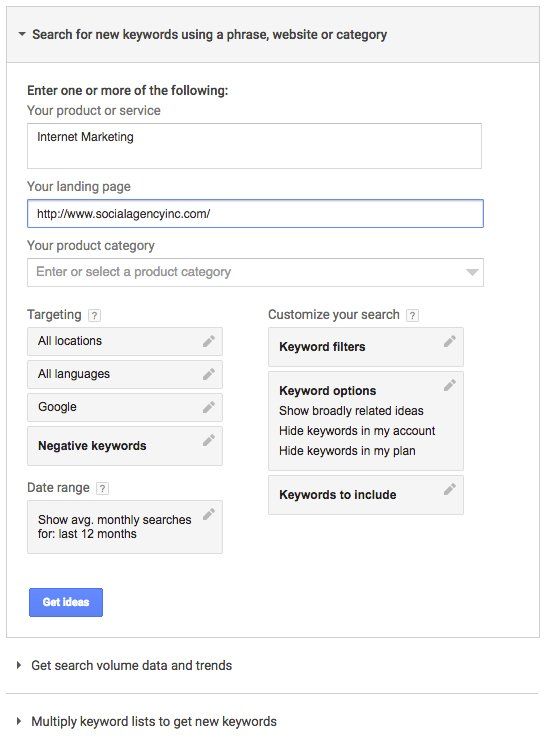
Filling out ‘Your Product or Service’ is optional in my opinion. I do not think it alters enough of the given keywords besides isolating the one you are already trying to rank for. For the sake of this explanation, I will include it.
As you can see from our page, build out they are suggesting some pretty big numbers. Readouts such as ‘Internet marketing,’ ‘web design,’ and ‘online marketing’ are all relevant to our company.
The competition score here means that there are many people basing their pages off of these keywords specifically. The tab next to that says ‘Suggested Bid’ which means how much they recommend if you are going to launch a PPC, or pay-per-click, campaign.
So the good news is that we have found great relevant keywords. The bad news is that it will take years to rank for those keywords and the people at the top are working just as hard to stay there. So how can we find equally relevant keywords that are easier to attain?
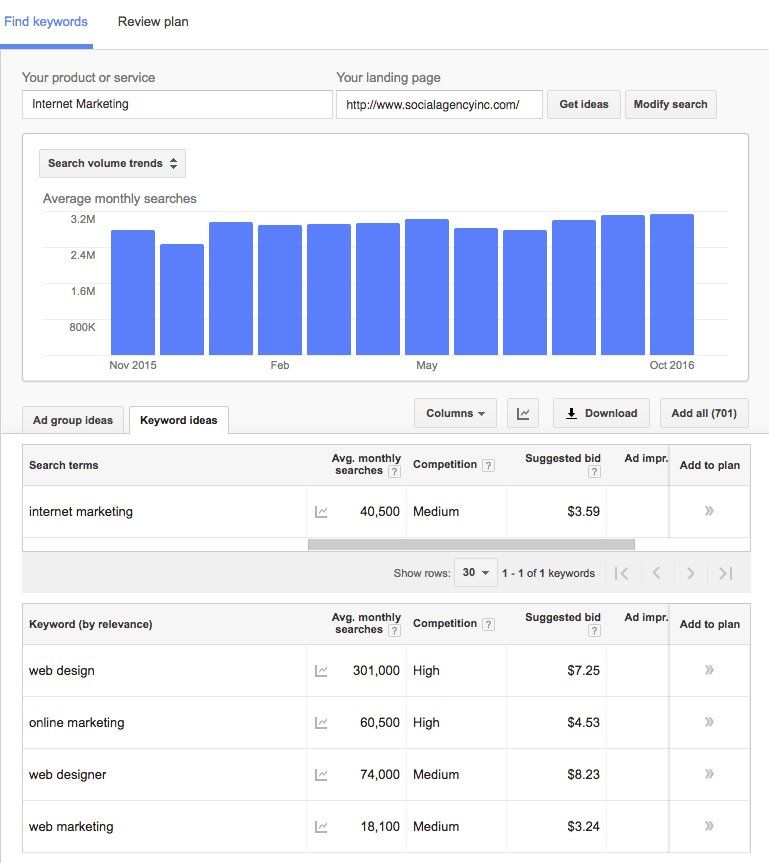
What Is The Longtail Keyword?
The longtail keyword is a trade term for keywords that are extremely specific for one market. The concept is that if you were to graph all of the monthly searches that Google has it would have a fat head and a long tail.
The fat head is common searches and resemble 20% of the search volume. These are phrases such as brand names (Facebook, Google) and hugely requested items (Paper and Pencils.)
But the longtail is 70% of the searches, and these are either small keywords or keywords that have never even been searched before. These exist because you do not usually see ‘Google has found no results’ anymore. This is because Google always has results to find based on the content of the website.
So if we can generate longtail keywords for our website we can find markets that are attainable for us to achieve.
How to find Longtail Keywords?
So for me, I use longtailgenerator.com. Which you can see an example of it to the right. So you can see it is broken up into three distinct areas, Primary, Descriptive, and Modifier keywords.
Continuing with our example, I am going to go back and use those keywords I mentioned before: Internet Marketing, Web Design, and Online Marketing.
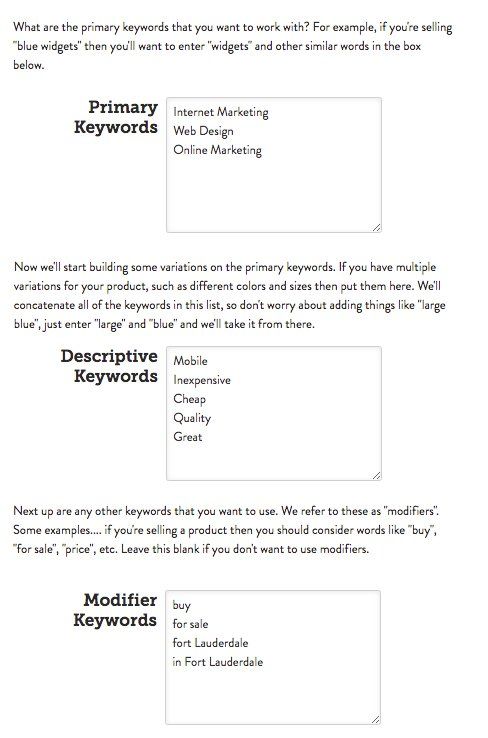
Next, it says that we should use descriptive words if we have different variations of our product. Well, we also offer our services on mobile devices. We also offer deals on website packages, so I will use inexpensive and cheap. I also want to show that we are good so I will use the word quality and great. It cannot hurt to add more adjectives.
Finally, we come to Modifier keywords, which are terms such as buy, or for sale, or price. These apply, so I am going to go ahead and keep buy and for sale.
Since people enjoy going to places in person, I am going to include the city nearest to me to see if anything comes up. So I am going to add ‘Sydney’ and just for good measure ‘in Sydney.’
So my list ends up looking like this, which isn’t that much. We are going to hit the ‘Generate My Keywords’ button and we will receive a page layout that looks like the image shown below.
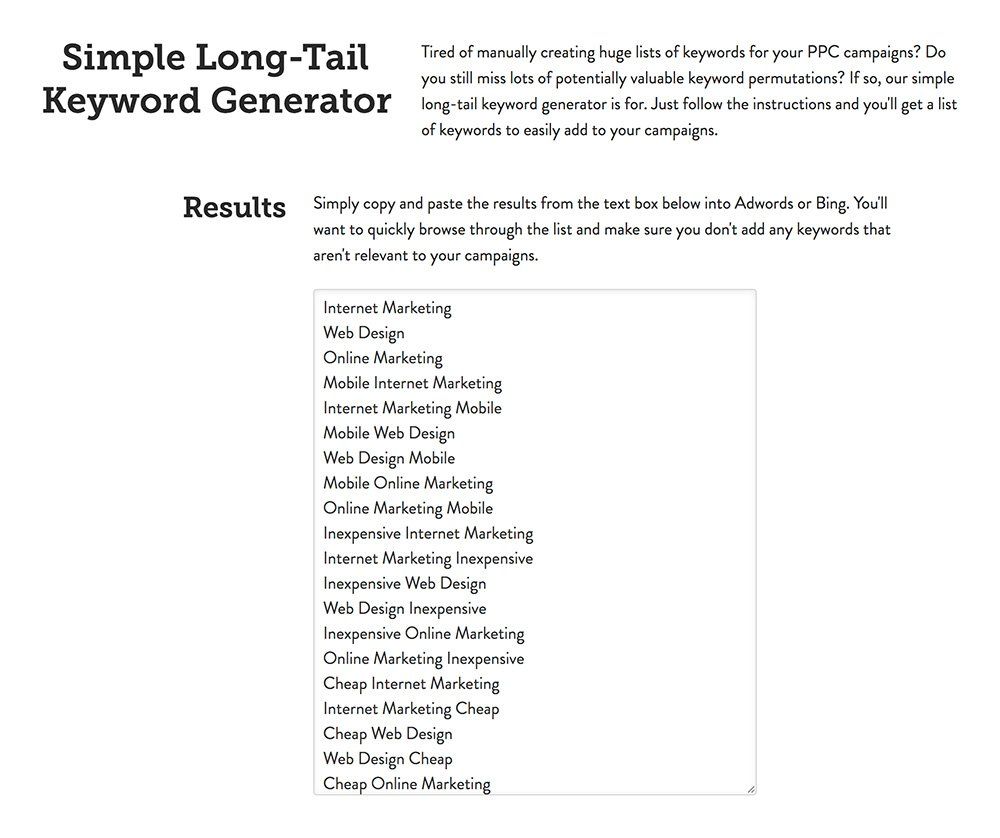
How to Search for Longtail Keywords
Now that we have our longtail keywords, it is time to explore the second option in Keyword Planner. We are going to highlight all of the longtail keywords and copy them. Then we are going to open up the keyword planner and click the tab that reads ‘Get Search Volume and Trends’ which should look like this.
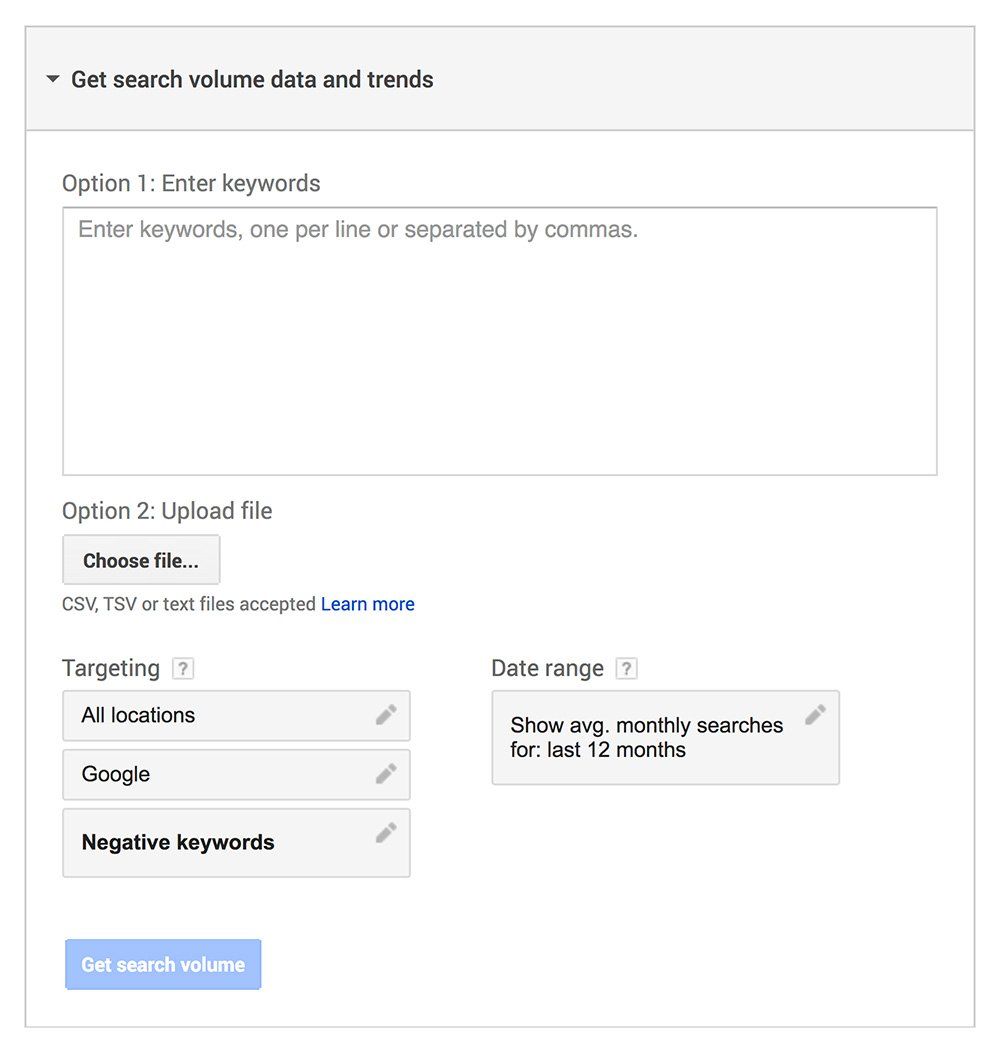
Fill the box with all of those longtail keywords by pasting them into the open field, then press ‘Get Search Results.’
Now we have much more keywords that are relevant to us and achievable. Terms such as ‘Mobile Website Design,’ ‘Great Website Design,’ and the variants ‘Web Design Sydney’ & ‘Sydney Web Design;’ will help us immensely.
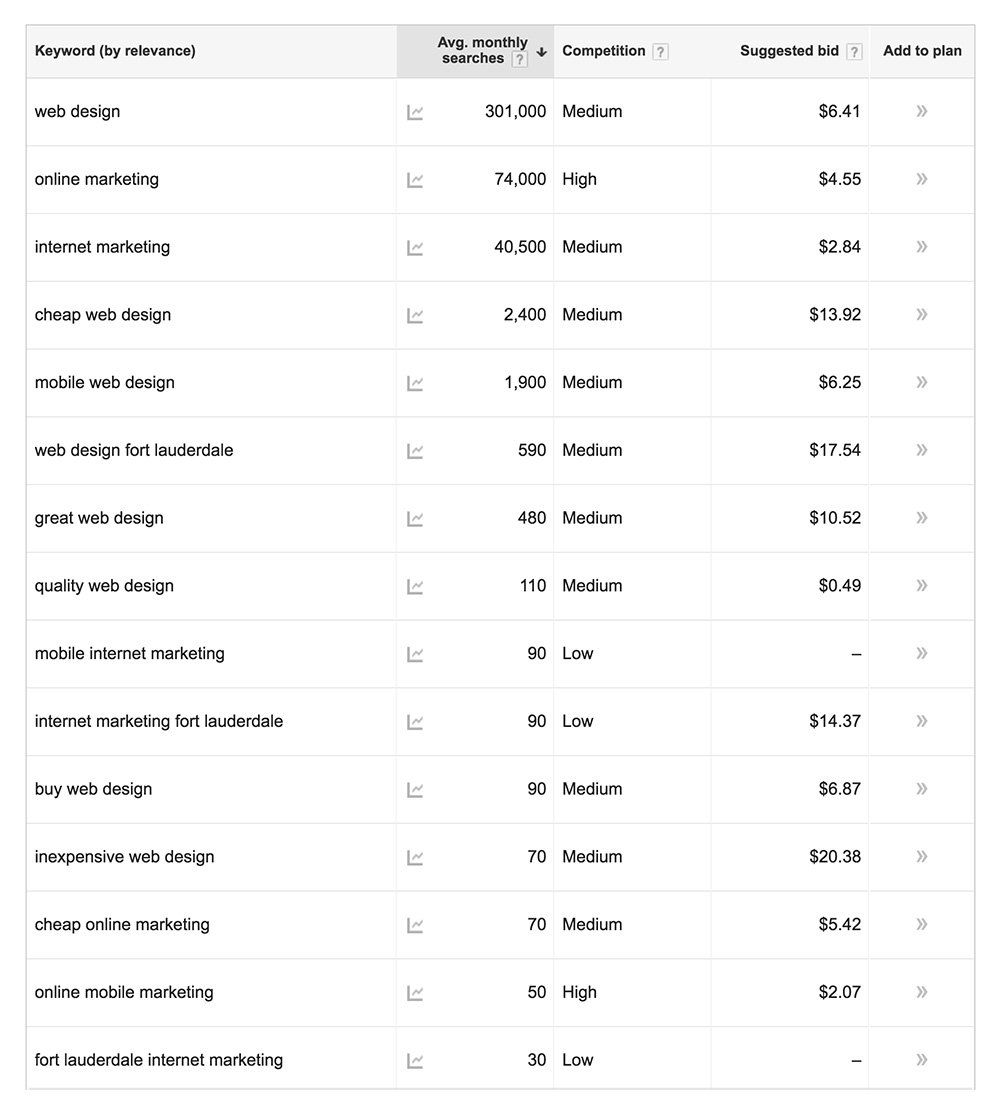
Conclusion
This is the same way that we do our keyword research for most of our clients. Google is arguably the most powerful tool for keyword research on the market though there are others.
Companies such as Moz, Raven Tools, and Bing have their keyword tools that can help you find keywords that are relevant and trending for your business.
By using Google, you are receiving the keywords straight from the source. Longtail Generator is a powerful tool that will smash together as many different keywords as you see fit. Using the two of them together can help you find the keywords that work best for your website.
If you feel as though this is too much work or not worth the hassle, give us a call. We have been providing internet marketing in Sydney for several years and constantly work to put our clients on the top of the search engines.
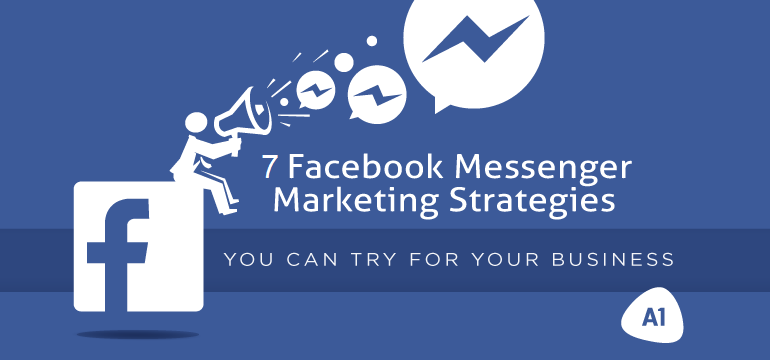
Facebook Messenger marketing is one of the most influential tactics available to marketers today.
Messenger marketing gains enormous scale when it’s backed by powerful conversation driven automated messages.
In this article, we want to explain exactly how Facebook Messenger marketing works, what role chatbots play, and how you can use this tactic to improve and boost your marketing activities.
A quality website is important for a small business. Why?
More and more people are searching the internet for businesses, products, services, etc. So if you’re not staying competitive with your competition, you’re giving shoppers a reason to buy from another business.
Consider this: 81 percent of customers perform online research before making a purchase.
The days of relying on phone books and passing foot traffic are long gone. If someone needs to find information, they are most likely turning to the internet to find it. When they search for something you offer or specifically for your type of business, you want to show up- and not just show up- but show up and look good.
Looking good is important because your website is often the first impression you give potential customers. If they found you through a search or through a link a friend gave them, your website will be your first point of contact with them. Before they even see your store or talk to your staff, they will see your website. You want that first impression to be a good one.

What Do You Mean “Working”?
Using the term “Working” while addressing if your search engine optimization (SEO) is effective can come across as being rather vague. In this respect, you will need to define what a “working” campaign would be for your business. This will include:
Deciding Your Goals
What are you looking to accomplish with this SEO campaign? Is it merely for monetary gains and heavier online traffic? Are you looking for more brand exposure?
There are many questions you should ask yourself before jumping into a possible SEO campaign. Once you know what you are looking to accomplish, you can focus on the best process to reach this outcome.

There are many terminologies thrown around in terms of establishing yourself in the online marketplace. Between the terms of SEO, PPC, social media management, and content marketing, it can be a little daunting to launch yourself onto the internet.
But one of the most important aspects of these is content marketing, and it’s not as new or groundbreaking as you might think.
Content marketing is incredibly important to your customers, future clients, and more importantly fans. The whole idea around content marketing is that you promote and create something that is pertinent to your business.
When people arrive at your website or your place of business, they don’t want to just listen to what you have to provide. While most people are happy with building service and location pages to help their superficial SEO, it doesn’t help with establishing trust and entertainment for your customers.
SEO and content marketing work in tandem that way. While SEO is a great way to reach an audience, once you’ve attained them you need to have something to say. If you have a website that is riddled with ‘Buy Now’ or ‘Call here’ buttons, what is driving them to the sale?
When people are on your site or in your business, they are already there to buy something. It’s what you do with the site or business that makes you stand apart from your competition. What’s to stop the customer from going down the street to a different shop with competitive prices?
Content marketing gives your business a voice and a personality in a world filled with numbers and bottom lines.
What is Content Marketing, Though?
Content Marketing is any sort of supplementary content that the customer can enjoy. You want to turn the customer into an audience member. Content is for them to enjoy, consume, understand.
Whether this is a blog post, an FAQ section, an informational or entertaining video, a podcast that’s informative, or a funny newsletter. Anything that can make your customer enjoy your presence as more than a provider of a product.
For example, Dollar Shave Club is a brand that sells itself on being fun and interesting. From their first advertisement, they set themselves apart through their tone and attitude. Then they followed that up with the Bathroom Minutes. There’s a newsletter they send with every package for your reading pleasure in the bathroom. Not only is this entertaining, but it’s also appropriate. It fits within their M.O.

Having your own website is liberating. You have a place that people can go to that explains what your company or service is all about. With that, you now have entered into the unchecked arena that is the online search results.
With all of these competitors and similar sites, it might seem impossible to increase traffic to your site. But if there’s anything we know how to do at Traffic Digital it’s just that!
Firstly, there are several things that you can do to increase the traffic to your site. Anything and everything can be optimised on a site and yet they often aren’t. Because of this, we have broken up our list into things you can do on the page and off!
1. On-Page Optimisation
On-page optimisation has everything to do with what the viewer can see. From content to image sizes, it can be optimised for user experience and search engines alike. The following tools are great ways to judge and determine what makes a great page: Google Pagespeed Insights and Pingdom to determine page-speed and image sizes, and we will use the Yoast plugin for content optimisation.
For the sake of on-page studies, we will use aventurabrakesandauto.com
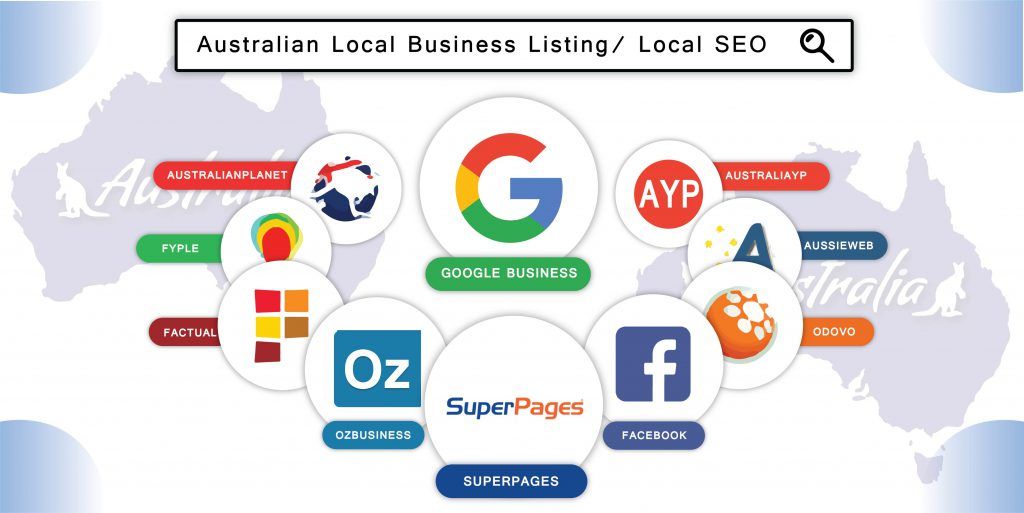
In an age run by technology, the only way a company can even hope to stay afloat, let alone succeed and grow is through an in-depth and thorough understanding of how to utilise the technology.
Regarding advertising, no other technological field has become more invaluable then that of the internet. The internet allows for companies and the buying populace to connect more efficiently and more often.
This is both a blessing and a curse, as poor online listings mean a company is falling under the gaze of the people they are trying to reach; this can spell the potential death of a company.
But fret not, for if your listings are not getting the traffic you are wishing they were receiving, allow us to share some tips and tricks for improving your listings viewer numbers.
1. Identifying Industry Hot Spots
Search for your site on an engine like Google and see what the results show you. Investigate other companies that offer the same goods or services that yours does and for those who sit higher in the search engine rankings, see what they are doing that separates them from your company. See what types of language, they are utilising, and once you have the information you need, images, videos, and other multimedia can start to take steps in improving your own listing’s online visibility.
2. Claim It
Claiming listings is something every company should take advantage of when it comes to generating online traffic. Claiming listings allows you to take control of the information people are finding on these sites. You can then upload photos, update contact information, even share updates about promotions or specials you are having.
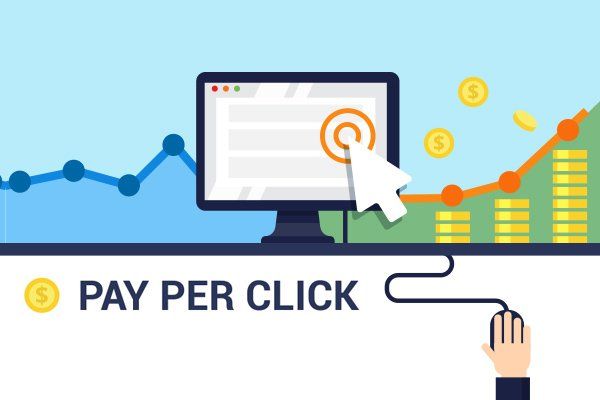
If you are considering paid advertising for your business, you’ve probably got a lot of thoughts going through your head. You are probably figuring out these systems for the first time, figuring out how much you want to spend and how much you want to gain.
But before you start seeing dollar bills floating in front of your eyes, we suggest you take a moment to read about a PPC Manager.
What is a PPC Manager?
A PPC manager is someone who manages your paid advertisements for you. While you set your budget, they will be creating all of the assets and materials you would need for a successful ad campaign.
What do they know?
How would a PPC manager know your business and trade better than you? In short, we don’t, and that’s the point. You know your business better than anyone, and paid marketing is our business.
If you’ve ever watched a movie or spoken to a salesperson about selling they will always tell you that selling isn’t actually about the product, it’s about the consumer.
That side of the business is exactly what we handle and how we do our jobs. We combine the people who want to buy your product with the expertise of how to approach them to make the sale.
Our experience and sales savvy can help you save tons of money and time from costly mistakes and rookie ideas.
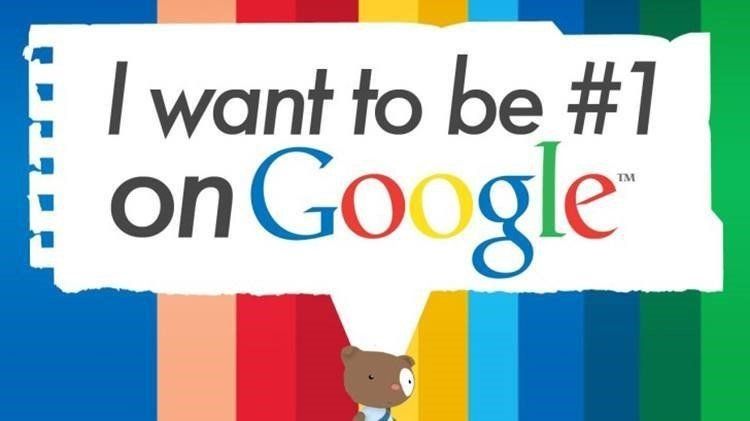
The first page of Google is getting a little long. On a recent survey of the term ‘plumber’, there are now 23 objects you can click on before you can reach page two or any of the ‘did you mean’ options.
Of those 23 options:
- 6 are AdWords
- 3 are Sponsored Google Services
- 3 are Default Local Listings by Zip Code
- 1 is an in-set Snippet from Wikipedia
- 10 are SEO-Based Links
Being on the first page doesn’t even guarantee you’re the first option someone chooses anymore. You have to scroll down a whole page length to even reach the organic SEO options.
Even then you are beginning to deal with a serious problem when you have to realise that ranking for Plumber doesn’t even guarantee you’re the first business listed through SEO thanks to directories surging to the top of the search results.
But despite this bizarre layout of the new first page, there is still hope for SEO after all. SEO isn’t gone, but it does need to be upgraded.
There’s Room in Google For SEO
Google’s response here is evident. SEO is still important; it’s just not as important as it was before. With many different directories, local listings, social media outlets and more offering up as many options to finding local businesses like Google, it’s time that Google needs to grow and adapt.
SEO choices are still there, but there are many tertiary services that Google cannot allow to take dominance because it is both a threat to their platform and an undermining of the work that many businesses put into their own markets.
Of the top ten SEO results from before, 3 are directories or review sites, 1 is Wikipedia, 1 is a nationwide plumbing service, and 4 of them are genuine local businesses to me that are trying to rank in the city alone.
This makes the outlook for mainline SEO seem bleak, but surely longtail keywords will suffice, right?
Of the top ten SEO results from before, 3 are directories or review sites, 1 is Wikipedia, 1 is a nationwide plumbing service, and 4 of them are genuine local businesses to me that are trying to rank in the city alone.
5 Directories or Review sites (With Yelp twice, of all places), 1 Nationwide Plumbing Services, and four local businesses.
The same amount of ads are there, but there is no rich snippet from Wikipedia about what a plumber is.

Social media is a powerful marketing tool to reach your audience and create an online presence for your brand. However, when it comes to advertising, technology is a prerequisite and has always played a vital part in its dispersal and attainability. From flyers promoting the local shopping mart to pop-up ads appearing on your phone, technology has made advertising much more readily available.
It did not take long for companies to realize the power of utilizing social media platforms to get their brands noticed. In the past several years, space has become more restricted and competitive for brands and businesses to get themselves seen on these platforms.
This led to Facebook offering its “Pay-Per-Click” or PPC campaigns.
This being said, being wary of something new is understandable, so we are here to go through what exactly a Facebook PPC campaign is, and if it’s worth it.

It is an exciting prospect; you are prepping your online business to take off finally. But this is your first outing into the world of online business and are unsure as to what to do, or more importantly what to avoid, to be successful.
To ensure that you are prepared for such an auspicious event we at Traffic Digital would like to give you some tips on some mistakes that should be avoided for your new business venture to take off running.
What Business Tactics Should You Avoid
- Don’t sweat the small stuff – Being in control and making sure everything is going off without a hitch is vital for a new business owner, but be sure you stay in power. Putting all of your focus on your new logo or your business cards not looking exactly how you wanted, though annoying do not require too much of your time. You should be focusing on tasks that your business needs to be completed to push itself forward.
- Be careful with your money – Though you are planning on making quite the return with your online business taking off and elevating you to new heights of income and business prestige, remember your current financial standings. Make sure you have a plan for recovering the funds you put into your company start-up.
- Too many “Free Samples” – Though it may seem like the right way to rope in potential clientele you want to be careful when it comes to giving out free samples. They may be free for others, for you they are another piece of merchandise that cost you money.
- Not understanding the time and effort – Do not underestimate the amount of time and effort it will take not only to get your online business off the ground but the attention you will have to devote to it to keep it afloat. Additional jobs will take the focus away from your new business needs from you.
- Having someone else run your online business – This is your business. You need to be in charge, hands-on and be the first person to do anything within the company. You should be the one deciding the company’s agendas, vendors, schedules, etc.
Starting up a new company is not easy, and will require a lot of attention, effort, and it may seem like you cannot do it. But you need to push through these doubts, nothing ever worth having will come easy.
